Infographics from the Nursing master's thesis work | July 27th, 2023
Ingram School of Nursing, McGill University
Published online: July 27th, 2023Exploring the Influence of Fear of Cancer Recurrence on Physical Activity and Work Ability among Young Adults with Lymphoma
2Hematologist, Oncology Department, Jewish General Hospital, Montréal, Québec, Canada,
3Division of Experimental Medicine, Faculty Of Medicine And Health Sciences, McGill University, Montréal, Québec, Canada,
4Department of Kinesiology And Physical Education, Faculty of Education Resources & Offices, McGill University, Montréal, Québec, Canada,
5Faculty of Medicine and Health Sciences, School of Kinesiology and Human Kinetics, Université de Montréal, Montréal, Québec, Canada
Corresponding Author: Christine Maheu, email: christine.maheu@mcgill.ca
Abstract
Purpose: Lymphoma is a prevalent form of cancer among young adults and advancements in treatment options have significantly improved survival rates. Despite this fair prognosis, survivors will continue to suffer from long-term physical and psychological symptoms after their treatment. Many survivors report that the fear of cancer recurrence (FCR) is a distressing challenge and that engaging in physical activity and work ability are also common concerns. Engaging in physical activity (PA) has been shown to have many benefits for cancer survivors, which is strongly correlated with return to work and return to school. However, the role of FCR in this association remains unclear. Methods: To address this gap, a cross-sectional study was used to examine the relationship between FCR, work ability and PA levels. To examine this relationship, data was collected from 22 young adults with lymphoma. This study used mediation and moderation models to explore how FCR affects both physical activity (PA) and the ability to work. Main findings: The study sample consisted of working-age adults with lymphoma having a mean age of 31.8 years, of which the majority were women (86.4%). While a significant, positive correlation (P = .05) was found between PA and work ability, neither the mediation nor moderation models used to explore the influence of FCR on this relationship were found to be significant. Conclusions: With the present study demonstrating a positive association between PA and work ability, it suggests that healthcare practitioners should place priority in promoting PA as an integral component of cancer care to enhance return to work and school. This study also highlights the need for continued research to further explore the influence of FCR on PA and return to work and school.
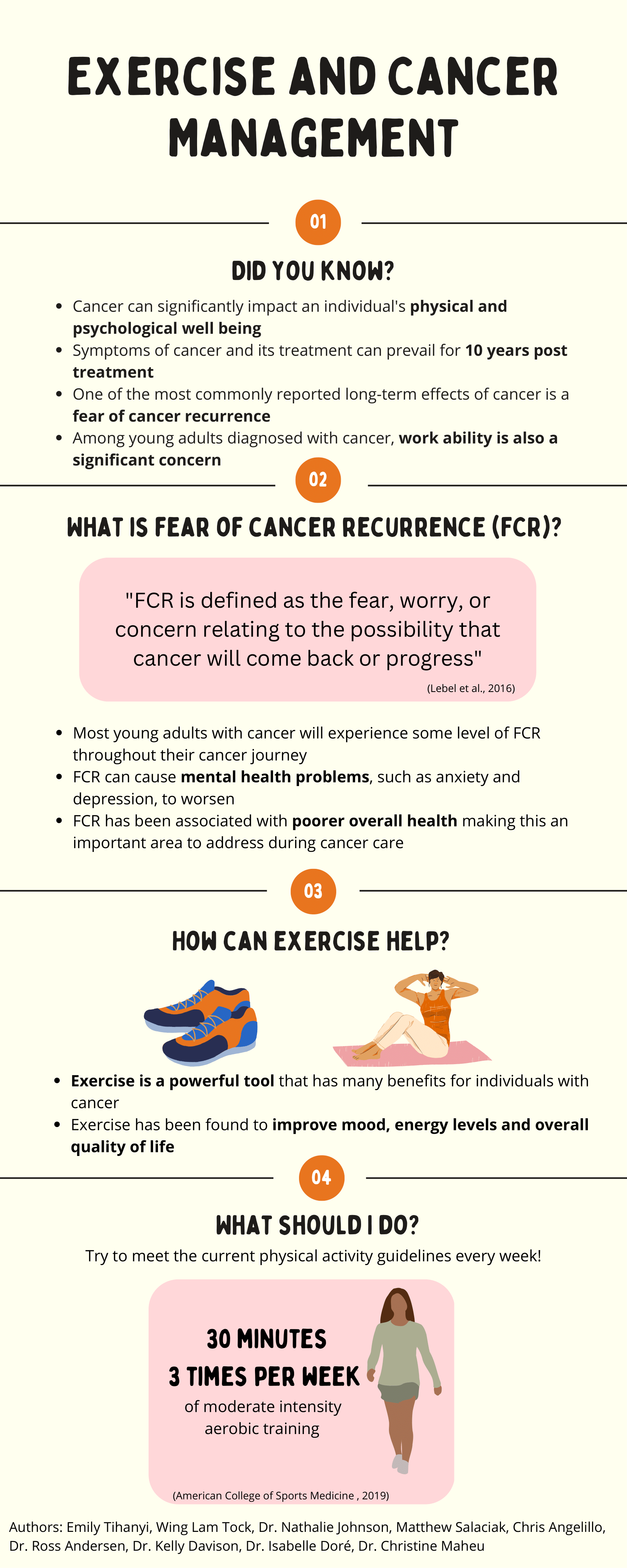
Online Learning in Undergraduate Nursing Education: Supporting Student Self-Efficacy and Satisfaction
2Research Institute of the McGill University Health Centre, Montreal, QC, Canada
Corresponding Author: Anita J. Gagnon, RN, MPH, PhD , email: anita.gagnon@mcgill.ca
Abstract
Introduction: The primary aim of the study was to determine how student characteristics, including self-efficacy, influence the satisfaction of students engaged in online nursing undergraduate education. A secondary aim was to identify aspects of the online program that may be considered for modification to improve students’ satisfaction. Methods: A concurrent mixed-methods design was used. Data on baseline characteristics, self-efficacy and satisfaction was collected via questionnaires. These were de-nominalized and analyzed descriptively. Semi-structured interviews were conducted to identify areas for improvement. Thematic analysis was guided by the Community of Inquiry framework. Results: We identified a trend towards lower self-efficacy in first-year students, as well as those who had not yet passed their professional licensing exam. Participants were least satisfied with aspects of social presence. As a result, students looked for external, informal sources of social support. These informal spaces were considered particularly significant in assisting students adapt to the demands of higher education and the challenges encountered in online learning environments. Discussion: Our findings highlight the difficulties students face in adapting to online learning and higher education The results of this study will be used to improve and inform pedagogical strategies for future online nursing program development. Furthermore, our findings contribute to the overall body of knowledge surrounding online nursing pedagogy.
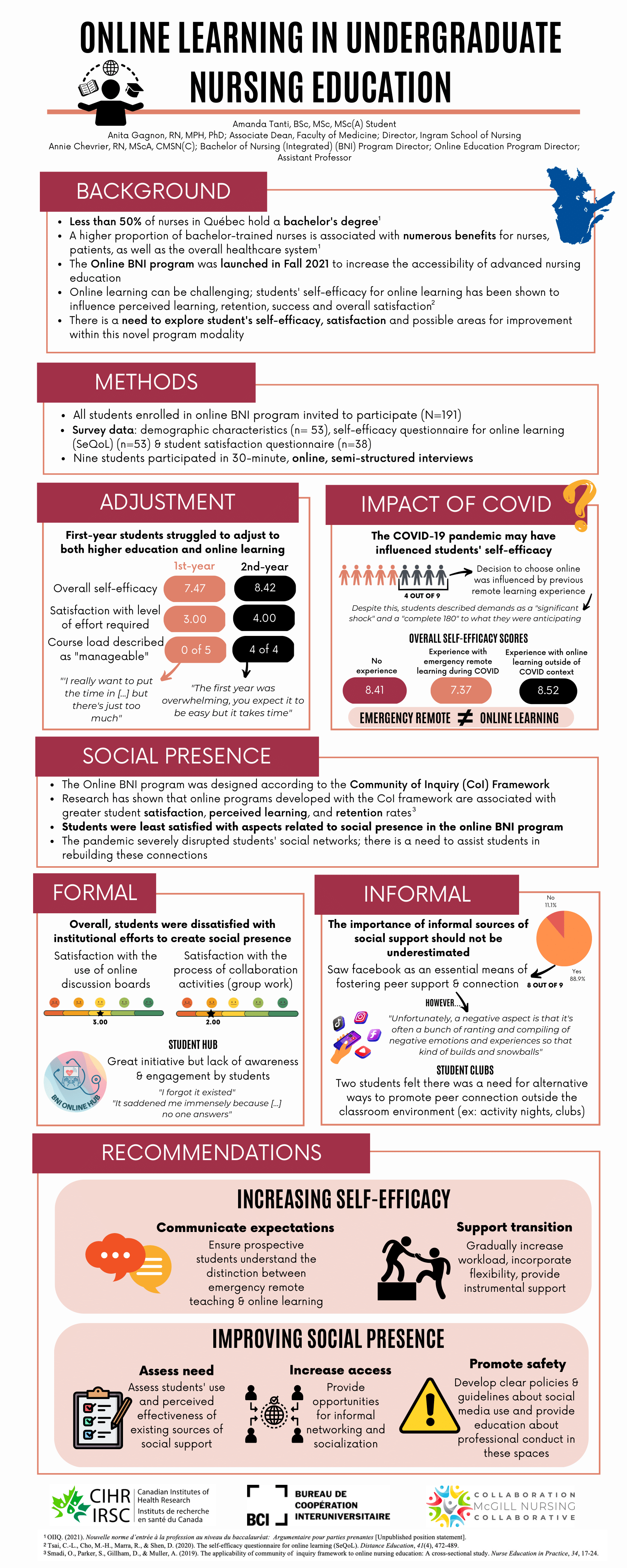
Coping Together Advanced: Evaluating the acceptability of the self-directed, self-management intervention for patients with advanced cancer and their caregivers
2Research Institute of the McGill University Health Centre, Montreal, QC, Canada,
3Université de Montréal, Montreal, QC, Canada,
4Princess Margaret Cancer Centre, Toronto, ON, Canada,
5Toronto General Research Institute, Toronto, ON, Canada,
6St. Mary's Hospital Centre, Montreal, QC, Canada,
7Jewish General Hospital, Montreal, QC, Canada
Corresponding Author: Sylvie Lambert, email: sylvie.lambert@mcgill.ca
Abstract
Context: Coping-Together is a self-directed, self-management intervention that has been found to benefit patients in early-stages of cancer and their caregivers. This study aims to evaluate the acceptability of Coping-Together among patients with advanced cancer and their caregivers. This was done to identify potential adaptions for those facing an advanced cancer. Methods: 24 participants (patients with advanced cancer and their caregivers) were given the Coping-Together materials (6 booklets and a workbook) to use for seven weeks. Participants were interviewed at 2 time points to solicit detailed feedback on the intervention’s content, design, and recommended changes. Audio-recorded interviews were transcribed verbatim, coded, and codes were then grouped into categories, yielding patterns and overarching themes. Results: The main facilitators to using the materials were having an interest in the material and the desire to improve coping skills. The perceived benefits were mostly improved strategies for coping using a SMARTTER approach (specific, measurable, attainable, relevant, timely, and done together), normalizing challenges, and enhanced communication. The top self-management strategies learned were monitoring symptoms, reducing stress, reframing outlook, and communication methods. Barriers include physical and accessibility constraints such as severity of illness and lack of time. Unique advanced cancer needs include support related to fear of death, uncertainty and feeling like a burden to others. Conclusion: Patients and caregivers reported benefiting from Coping-Together by creating SMARTTER plans for implementing self-management strategies and improving their outlook on cancer. Specific areas for improvement address the unique needs for advanced cancer, such as including palliative care information.
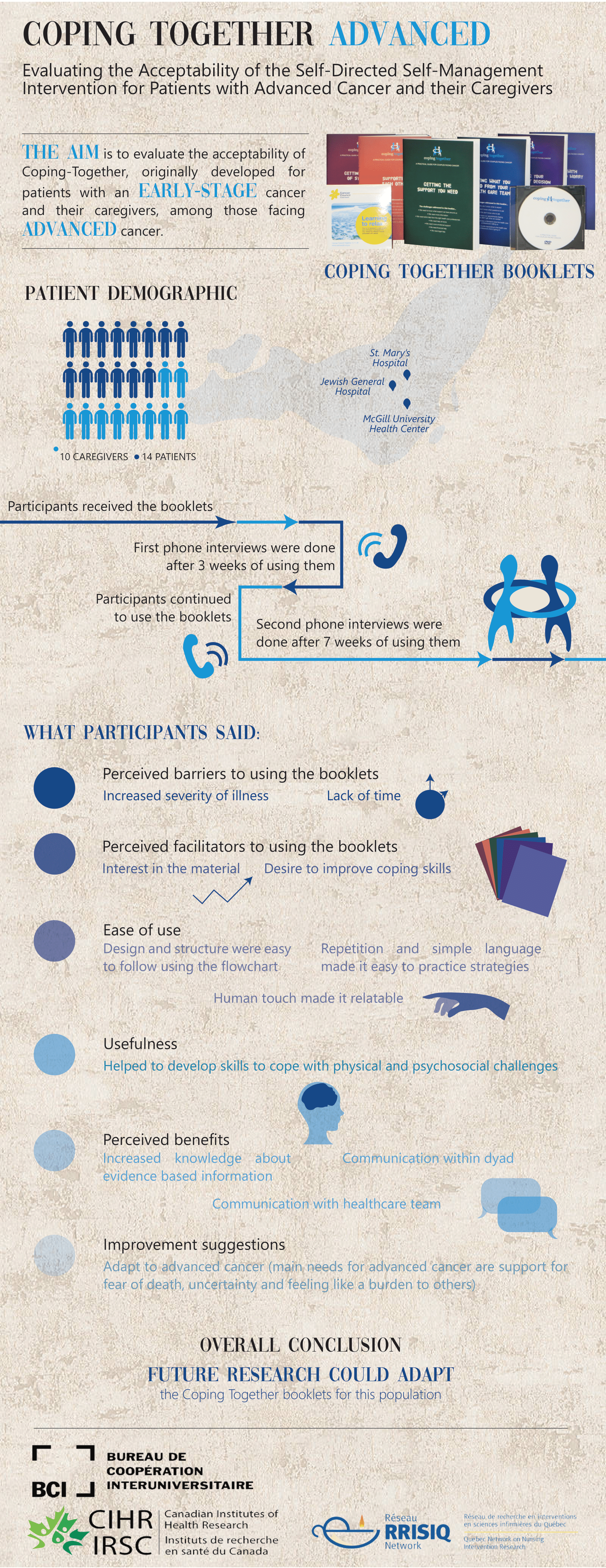
Exploring a transition of care model for women with endometrial cancer from patient and healthcare provider perspectives
2McGill University Health Centre, Montreal, QC, Canada.
Corresponding Author: Christine Maheu , email: christine.maheu@mcgill.ca
Abstract
Purpose: To describe the experiences and levels of satisfaction, from the perspective of endometrial cancer patients and healthcare providers (HCPs), on the support and guidance received in the shared care model “Cancer Care Transition of Care Program” (CCTCP) at the McGill University Health Centre (MUHC). Methods: A convergent mixed method approach was used. Semi-structured qualitative interviews were conducted with patients and HCPs, and quantitative patient satisfaction levels were measured using a clinically developed questionnaire. Using descriptive statistics and content analysis, the data was analyzed then integrated using a weaving approach and fit of data integration. Results: Eight participants (n = 8) were included; five endometrial cancer patients and three HCPs from the MUHC who are taking part in the CCTCP. Four themes emerged: 1) satisfaction with support and guidance from CCTCP, 2) shared care experience, 3) psychosocial needs, and 4) participant recommendations for improvement. Cancer patients and HCPs reported positive experiences related to the information provided on the program’s resources, quality of care provided by community gynecologists, and overall satisfaction with shared care. Communication between specialists and community HCPs was highlighted as a challenge. Patients continued to experience psychosocial challenges post-treatment. Conclusion: Patients and HCPs reported overall positive experiences with the CCTCP. Interventions to promote regular communication amongst specialists and primary care HCPs should be explored to promote collaboration and enhance continuity of care. Alongside shared care models, resources such as survivorship plans and clinics can further provide supportive care to address continuing psychosocial issues experienced by cancer patients after treatment.
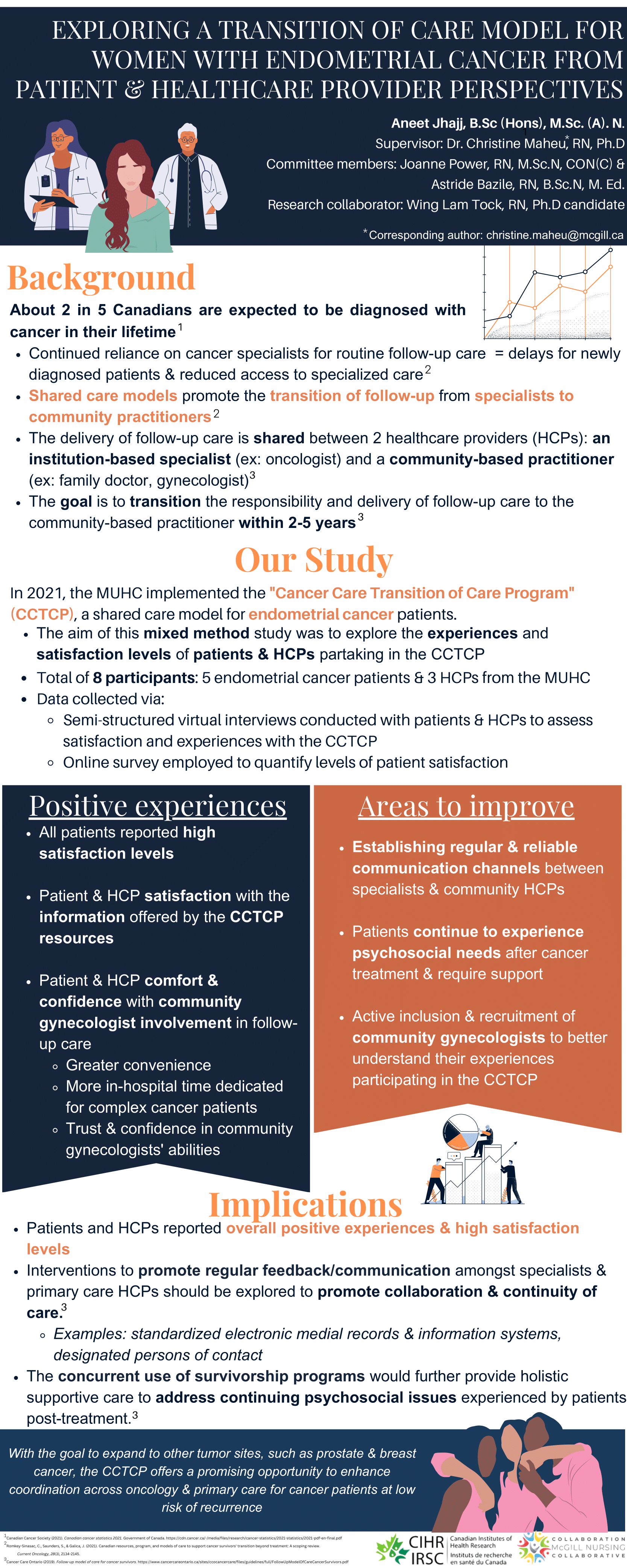
Ethical Considerations for Children Undergoing Surgery: Evaluation of Graduate Nursing Students’ Learning
2Shriners Hospitals for Children®-Canada, Montreal, Canada
Corresponding Author: Argerie Tsimicalis, email: argerie.tsimicalis@mcgill.ca
Abstract
Background: Multiple barriers can impede children’s meaningful involvement in their healthcare in the context of surgery. These include lack of clinician knowledge of the ethical considerations impacting children and scarce educational resources. Our team created an open-access training module (https://childsxethics.net/) to enhance clinicians’ understanding of ethical considerations for children undergoing surgery. Objective: To evaluate the level of Bloom’s Taxonomy cognitive, affective, and psychomotor learning reached by graduate nursing students after completing the training module. Methods: A qualitative descriptive study was conducted with 19 graduate nursing students. Data sources comprised of participants’ course assignments. Data were analysed inductively and deductively using Bloom’s Taxonomy. Results: Participants wrote 19 online reflections and 43 peer responses. Two subgroups of six participants each completed group assignments. The module and associated class assignments promoted high levels of cognitive and affective learning of ethical considerations for children undergoing surgery. The type of assignment influenced participants’ level of learning and achievement of learning objectives. Cognitive and affective learning processes were enhanced when integrating reflections and fostering dialogue/interaction among peer learners. Implications: Study findings will be used to improve the module. Future iterations will include collaborations to enhance the global relevance of the training module contents. Providing educational resources for clinicians on ethical considerations in children’s surgery will help facilitate the recognition of children as active moral agents, improve their surgical experiences, and draw attention to the impacts of ethical considerations in local and global contexts.
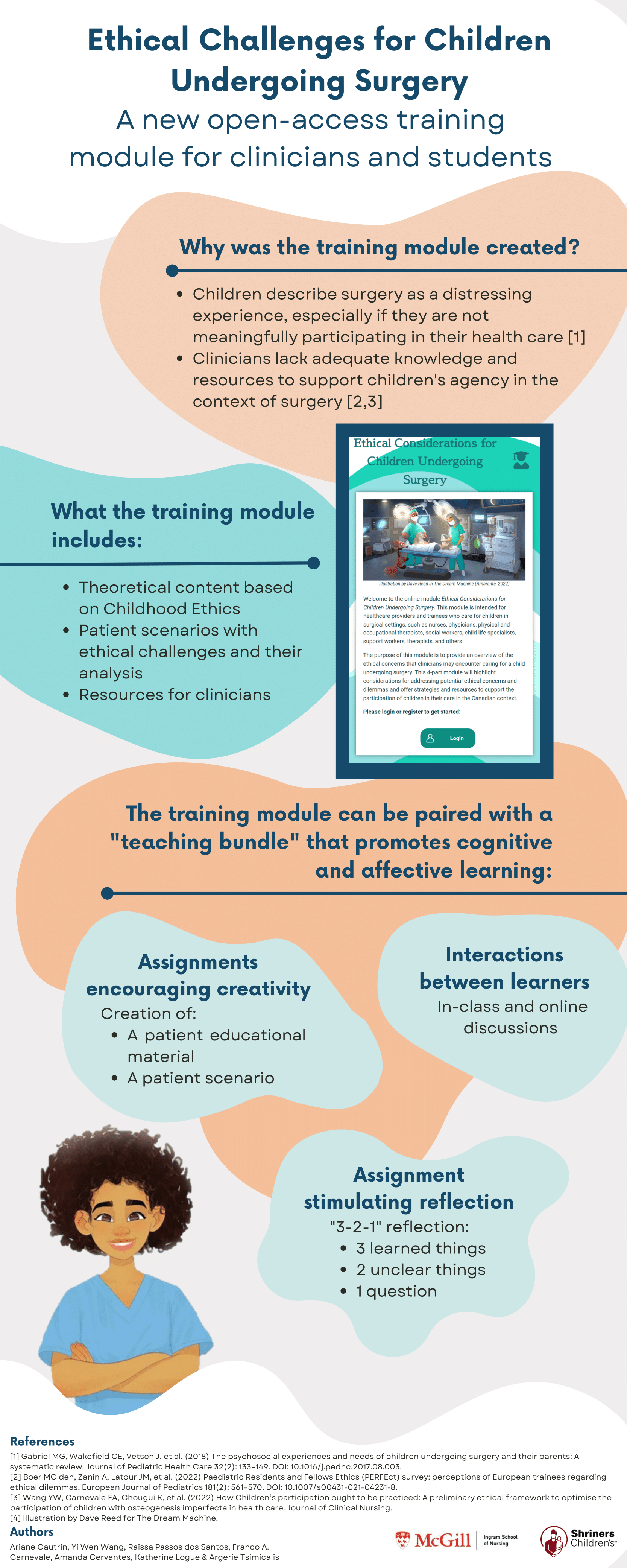
Work ability and quality of life outcomes of cancer survivors participants in a vocational rehabilitation led return to work pilot intervention
Corresponding Author: Christine Maheu, email: christine.maheu@mcgill.ca
Abstract
Background: iCanWork reflects the most recent evidence for an effective intervention to support cancer survivors' (CS) return to work (RTW) by emphasizing a multidisciplinary, vocational rehabilitation (VR)-led and work-focused approach to enhance work ability, health-related quality of life (HRQOL), and RTW rates. Objective: To evaluate the feasibility, acceptability, and preliminary efficacy of iCanWork, a VR-led web-based multidisciplinary intervention to support work ability, HRQOL, and RTW among CS. Methods: Twenty-four adult CS who had paid employment at the time of diagnosis and who had a job to return to were enrolled in the study. Twelve CS were assigned to iCanWork and twelve CS to the control group. CS assigned to iCanWork received professional consultations consisting of three online sessions with a VR counsellor and one to two sessions with an occupational therapist. All sessions were given within 2 to 4 months. CS participants completed study questionnaires at baseline, then again at 2 and 4 months post-baseline. Results: CS had a mean age of 47 (SD 9.9), 95% were women, and 29% had cancer other than breast. CS in the experimental group had statistically significant improvements in work ability, HRQOL, and RTW rates compared to controls. The intervention was deemed feasible, and CS in the control group also deemed the website support for RTW acceptable. Significance: The pilot study' positive results in terms of iCanWork's feasibility, acceptability, and preliminary efficacy support its testing in an RCT format.


This work is licensed under a Creative Commons Attribution-NonCommercial-ShareAlike 4.0 International License.